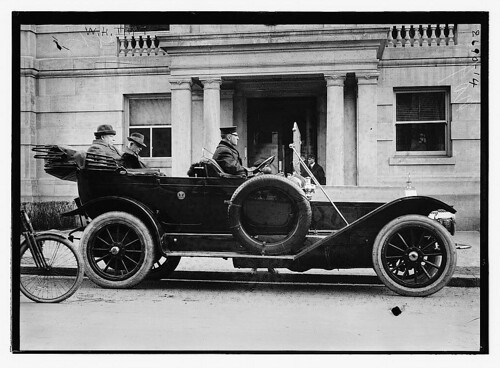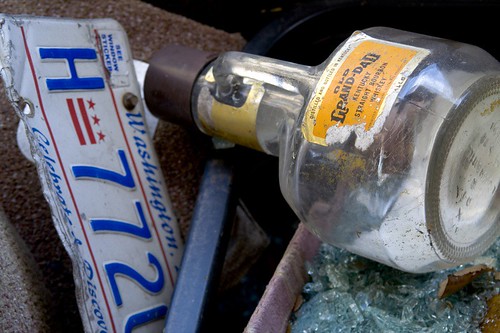
‘W.H. Taft (LOC)’ courtesy of ‘The Library of Congress’
Did you know that vehicle registration in the District has dropped?
According to a new report being presented today, registrations dropped almost six percent between 2005 and 2008, from 258,100 to 243,200. The drop is significant in that when compared to U.S. Census data, the population in DC increased 1.7 percent.
As a comparison, Maryland and Virginia communities around the DC metro area increased between 3 and 6 percent.
What’s not known is why the drop has occurred, though there are theories.

‘StraightBourbon_Baltimore_11.18.2006.jpg’ courtesy of ‘ellievanhoutte’
Some postulate that people moving into the area are younger or empty-nesters who don’t own a vehicle, replacing families who do have at least one car to their household. Certainly, fuel spikes last year may have been a cause, as some sold or got rid of their cars and embraced public transit or alternate forms of transportation. As an example, Clear Channel debuted their SmartBike program in August with plans for 40 more stations, adding hundreds of more bikes. Services like Zipcar have also taken off in the area, offering more than 700 vehicles in the District for hourly rental.
A side aspect of the study also found that the DC metro area possesses an older fleet of cars than in 2005, suggesting that many have held off on replacing their cars.

‘End of the day’ courtesy of ‘brianmka’
On a related note, Ellen Greenberg, a former Research Director for the Congress of New Urbanism, offered some intriguing perspectives on different ways to define ‘transportation success,’ looking at congestion and other studies with a varied eye. She was at the National Building Museum yesterday afternoon and WLDC’s own Shannon was there. Here’s what she had to say regarding the talk:
“Ellen spoke about how we should measure ‘success’ in transportation – through accessibility, rather than the lack of traffic. We are lucky in DC to have a lot of access to jobs/shopping/restaurants/nature/other opportunities, so we’re pretty successful in that realm, even if we do have one of the worst traffic congestion in the nation.
“One of the best parts of the lecture was Ellen’s focus on the element of time, and how it’s studied. Traffic engineers study volume/capacity on roads for the peak 15 minute period, which is 0.75% of the time in a week, but the roads that are built are there 100% of the time. So we’re building roads to accommodate a tiny fraction of time, but that large capacity is always there (and it’s not needed most of the time).
“She also mentioned that roads can last thousands of years, longer than the lifespan of buildings, sidewalks, etc. So roads survive generations and dictate the land pattern for future generations. I really liked that point: that by building bigger/wider roads, we’re building something that will last thousands of years just to accommodate 15 minutes of traffic avoidance. She also disagrees with how TTI tabulates time ‘wasted’ in traffic…. she says it’s not wasted, it’s time spent in traffic– you’re choosing to take that route at that time in that location because of your housing/job choices.”
It’s indeed an interesting perspective on all the traffic surveys and reports we see on a near-weekly basis. For you commuting and budding traffic planners out there, what’s your take on Ellen’s comments? And if you had the power, what would you do to strike a better balance?



